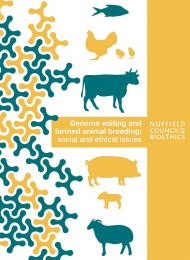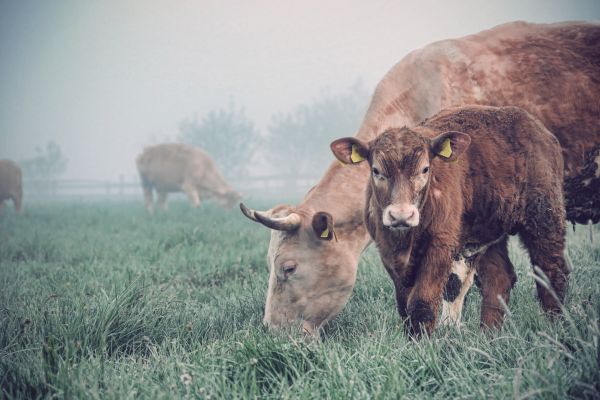Genome editing and farmed animal breeding: social and ethical issues
Report
Published 01/12/2021

Introduction
See chapter 1 of the full report
Since the 1700s, selective breeding of animals within the food and farming system has aimed to ensure agriculturally desirable features that are linked to increased productivity such as:
- Faster growth rate
- Increased fertility
- Increased resistance to disease
- Better adaptation to the environment in which animals are kept
Advances in molecular biology which have occurred since the 1970s have made it possible to alter an animal’s DNA directly. These include recombinant DNA technology (which can be used to insert genes from one species into the genome of another species) and cloning (using the technique of cell nuclear transfer to make an exact genetic copy of a living thing). These techniques are not currently used in commercial animal breeding in the UK. The cloning technique has been used mostly in the development of animals for xenotransplantation (the transplantation of living cells, tissues or organs from one species to another) and the production of pharmaceutical products rather than in agricultural applications, although there are animal breeding companies offering cloning to customers. Genetically modified crops are on sale in some parts of the world.
In recent decades, the increasing sophistication and affordability of DNA sequencing techniques has made it possible to produce standard reference genomes for several species of farmed animals. Scientists have been able to identify some of the genes and variants involved in traits like disease susceptibility and physiological features such as horn growth.
Genome editing techniques offer the potential to target and alter genes in specific ways. They present new opportunities for those involved in farmed animal breeding to exercise more control over the genetic make-up of new generations of animals. The emergence of genome editing is a significant moment, as it represents a possible step change in introducing a new generation of potentially transformative biotechnologies into the food and farming system.
The ethical and social issues raised by the use of genome editing technologies in farmed animal breeding are much broader than questions about the technique of genome editing itself. Genome editing is only one technology, recently developed, which may be supplemented or succeeded by other biological techniques as a way of achieving heritable changes in animals. Our conclusions are in this sense ‘technology-neutral’ and should apply equally to future breeding innovations.

Why is this report needed?
When we initiated this inquiry in 2019, we recognised that genome editing in farmed animals was a relatively near-term technology that raises distinctive ethical issues but that had received little in the way of public discussion.
During the latter part of our inquiry, in early 2021, the UK Government’s Department for Environment, Food & Rural Affairs (Defra) announced a consultation setting out plans to reform existing regulations that govern the use of genetically modified organisms (GMOs) in England.
In September 2021, in a response to the consultation, the UK Government announced it would seek to bring forward primary legislation at a suitable opportunity to amend the regulatory definitions of a GMO to exclude organisms that have genetic changes that could have been achieved through traditional breeding or which could occur naturally. This will mean that some genome edited organisms will not be regulated in the same way as genetically modified organisms. The Government has indicated it will allow time to consider the distinctive ethical questions that arise in relation to animal welfare before changes affecting animal breeding are made.
Our report is intended to inform the development of a broad policy context that supports an ethical future for livestock and fish farming in the UK and beyond.

Share